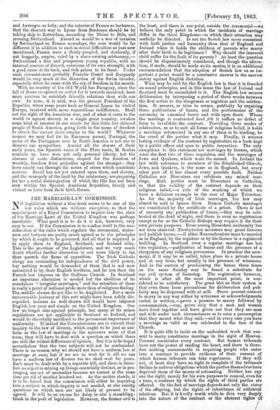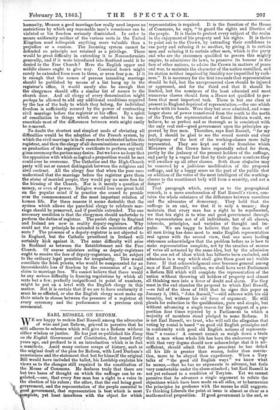THE MARRIAGE-LAW COMMISSION.
NO legislation without a blue-book seems to be one of the few rules which are without exception, so that' the appointment of a Royal Commission to inquire into the state of the Marriage Laws of the United Kingdom was perhaps inevitable. What good it is to do it is not, however, very easy to see. If the Commission is to confine itself to the con- sideration of the rules which regulate the ceremonial, states- men and lawyers are pretty much agreed as to the principles by which it ought to be governed, and all that is required is to apply them to England, Scotland, and Ireland alike. This is the province of the Legislature, and we very much doubt whether farther discussion is not more likely to fan than quench the flame of opposition. The Irish Catholic clergy are contending for independence of the civil power, but nothing would be demanded of them that is not now submitted to by their English brethren, and far less than the French law imposes on the Gallican Church. In Scotland no important alteration is needed but the abolition of its scandalous "irregular marriages," and the retention of these is really a point of national pride more than of religious feeling. The middle classes do not like to be Anglicized. But a mere unreasonable jealousy of this sort might have been safely dis- regarded, because no well-drawn bill would have imposed English law pure and simple on the United. Kingdom. Our law no longer sins against principle, but many of its minor regulations are not applicable to Scotland or Ireland, and would be cheerfully sacrificed to the paramount importance of uniformity. If indeed the Commissioners are to extend their inquiry to the law of divorce, which ought to be just as uni- form as the law of marriage in the narrower sense of that term, they will have to deal with a question on which there are still the widest differences of opinion. But it is to be hoped nevertheless that the two subjects will not be confounded. There is no reason why we should not have a uniform law of marriage at once, but if we are to wait for it till we can have a uniform law of divorce too we shall wait for years. Each must be dealt with by a separate bill, and there is there- fore no object in mixing up things essentially distinct, or in pro- longing one set of anomalies because we cannot at the same time get rid of another kindred set. As the matter stands, it is to be feared that the commission will either be inquiring into a subject in which inquiry is not needed, or else raising questions on which men are not likely at present to be agreed. It will be an excuse for delay or else a stumbling- block in the path of legislation. However, the former evil is the least, and there is one point outside the ceremonial—we believe the only point in which the incidents of marriage differ in the three Kingdoms—to which their attention may usefully be directed. Is not the Scotch law more consistent with both justice and humanity than that of England and Ireland when it holds the children of parents who marry after their birth to be legitimate ? Why should the.innocent child suffer for the fault of its parents ? At least the question should be dispassionately considered, and though the altera- tion, if made, should be made on its merits, it is an additional recommendation that the adoption of Scotch law on so im- portant a point would be a conclusive answer to the narrow outcry against English dictation.
What may be said for the English law is that it is founded on sound principles, and in this sense the law of Ireland and Scotland must be assimilated to it. The English law secures deliberation by interposing a period of three weeks between the first notice to the clergyman or registrar and the celebra- tion. It secures, or tries to secure, publicity by requiring three publications of banns, and the performance of the ceremony in canonical hours and with open doors. Where the marriage is contracted bond fide it suffers no defect of form to invalidate the contract. Providing three modes of celebration, so as to suit all forms of religious belief, it holds a marriage solemnized in any one of them to be binding, be the creed of the parties what it may. Finally, it secures lasting evidence of the contract by registration in a book kept by a public officer and open to public inspection. The only exceptions to this statement are marriages by licence, which want the first two of these requisites, and the marriages of Jews and Quakers, which want the second. In Ireland the law with reference to members of the Established Church, Jews, and Quakers is the same as in England, but every other part of it has almost every possible fault. Neither Catholics nor Dissenters can celebrate any mixed mar- riage. Both parties must be Dissenters or Catholics, so that the validity of the contract depends on their religious belief,—a rule of the working of which we have a delicious example in the case of Major Yelverton. Is for the majority of Irish marriages, the law may almost be said to ignore them. Roman Catholic marriages are constituted by the certificate of a priest. There is not of necessity any publication of banns,—they may be cele- brated at the dead of night, and there is even no registration except so far as the Catholic Bishops may require it for their own private purposes. Even among Dissenters uniformity has not been observed. Presbyterian ministers may grant licences and publish banns,—all other Nonconformists must be married as in England, by the registrar or by his licence in a registered building. In Scotland even a regular marriage has but two requisites,—publication of banns and the presence of a clergyman of any religious persuasion. In practice the cere- mony, if it may be so called, takes place in a private house and at any hour, but usually in the presence of witnesses. And in the custom of proclaiming the banns three times on the same Sunday may be found a substitute for our evil system of licensing. The registration however, which is after all the most important point, is con- sidered to be satisfactory. The great blot on their system is that even these loose precautions for deliberation and pub- licity may be dispensed with at will. Prove present consent to marry in any way either by witnesses or acknowledgments verbal or written,—prove a promise to marry followed by consummation, —nay, prove only that a man and woman have lived together and have given out that they are man and wife under such circumstances as to raise a presumption that they meant what they said,—and in every case you have a marriage as valid as one celebrated in the face of the Church.
It is quite idle to insist on the undoubted truth that con- sent to marry constitutes marriage in the sight of Heaven. Consent constitutes every contract. But human tribunals have not the power of reading the heart, and there is there- fore nothing unreasonable in requiring people who enter into a contract to provide evidence of their consent of which human tribunals can take cognizance. If they will not, at least they have no right to complain if the tribunals decline to enforce obligations which the parties themselves have deprived them of the means of estimating: Neither has any one the right, merely for his own purposes to conceal, even for a time, a contract by which the' rights of third parties are affected. On the fact of marriage depends not only the status of the offspring, but the rights of inheritance of collateral relatives. But it is hardly worth while to dive very deeply into the nature of the contract or the abstract rightsI f humanity, %cause a good inarriage-law really need impose no restrictions by which any reasonable man's conscience can be violated or his freedom seriously diminished. In order to secure uniformity neither of the various sects in the United Kingdom need relinquish anything more valuable than a prejudice or a custom. The licensing system cannot be defended on principle nor retained as a privilege. There would be great difficulty in extending it to Nonconformists generally, and if it were introduced into Scotland could it be denied to the Free Church ? Here the English upper and middle classes ought to give way. Canonical hours might surely be extended from noon to three, or even four p.m. If it is enough that the names of persons intending marriage should be published by means of a list hung up in the registrar's office, it would surely also be enough that the clergyman should affix a similar list of names to the church door. And all clergy of every denomination might perhaps be allowed to add any additional conditions required by the law of the body to which they belong, for individual freedom is sufficiently secured by the power of contracting civil marriage before the registrar at his office. By a spirit of conciliation in things which are admitted to be non- essentials most of the differences between sects might easily be removed.
No doubt the shortest and simplest mode of obviating all difficulties would be the adoption of the French system, by which the civil marriage is in all cases first celebrated before the registrar, and then the clergy of all denominations are at liberty on production of the registrar's certificate to perform any reli- gious ceremony the parties may desire. But we have no hope that the opposition with which so logical a proposition would be met could ever be overcome. The Catholics and the High-Church party will not or cannot distinguish between the religious and civil contract. All the .clergy fear that when the poor once understood that the marriage before the registrar gave them the status of married people, they would pay no more fees for the blessing of the Church. Nor is it merely a question of money, or even of power. Religion would lose one great hold on the popular mind if in practice she ceased to preside over the commencement of the most important relation of human life. For these reasons it seems desirable that the system which allows the parochial clergy to celebrate mar- riage should be preserved, and if possible extended. The one necessary condition is that the clergyman should undertake to perform the duties of registrar. The parish clergy in England and Ireland are now in reality deputy-registrars. Why could not the principle be extended to the ministers of other sects ? The presence of a deputy-registrar is not objected to in England, but the Catholic priesthood in Ireland will certainly kick against it. The same difficulty will arise in Scotland as between the Establishment and the Free Church. Of course ministers acting as deputy-registrars ought to receive the fees of deputy-registrars, and be subject to the ordinary legal penalties for irregularity. This would conciliate the Irish priests, who would be compensated for an inconsiderable loss of freedom by the concession of a legal claim to marriage fees. We cannot believe that there would be any serious difficulty in framing regulations by which all sects but a few, perfectly insignificant in point of numbers, might be put on a level with the English clergy in this matter. But it is certain that if we are to have uniformity it must be so effected, or else the English clergy must make up their minds to choose between the presence of a registrar at every ceremony and the performance of a previous civil ceremonial.



































 Previous page
Previous page